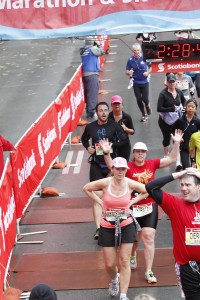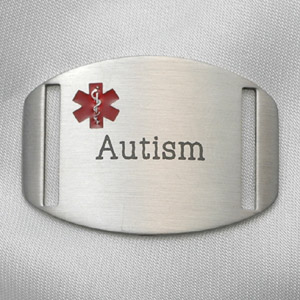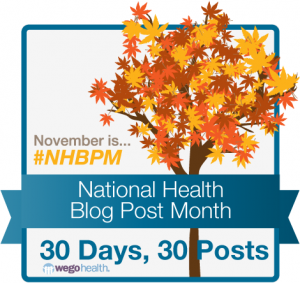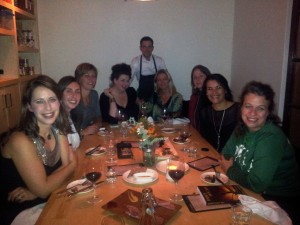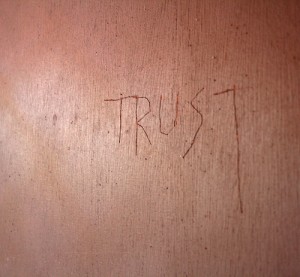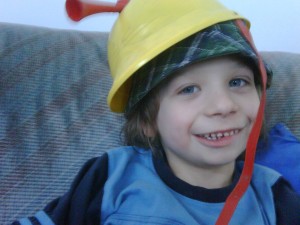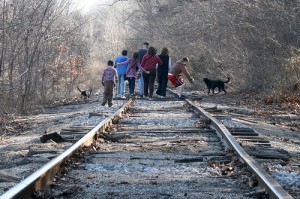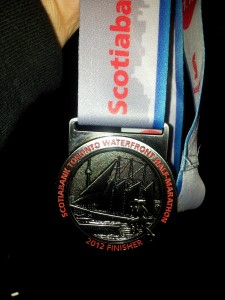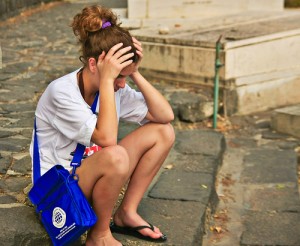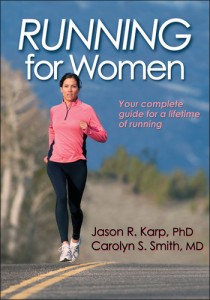In running, as in most areas of my life, I tend to be a goal-oriented person. Some people run just for the fun of it, but I need to have a purpose behind it, a goal to work towards. This, in addition to the addictive feeling of collective start-line energy, is the reason I run so many races. I will keep running through the winter because I have a half-marathon to work towards at the end of it. After that, there will be another half-marathon in the middle of the year. Then there will be my annual autism run in the fall.
I need these races to keep going. They give me the kind of discipline I would never find if left to my own devices. I sometimes procrastinate when it comes to actually deciding on the goals, but once I’ve made up my mind I’m very good at the follow-through.
For some time now I have been wavering about the idea of running a marathon. The full monty – the whole 26.2 miles or 42.2 kilometres. The whole cyclical thought process usually goes something like this:
My husband is driving me to the start of a half-marathon, and I am all excited and ready to go. I am caught up in the pre-race euphoria of it all, and I say to my husband that someday it would be really great to run a full marathon. I carry that thought with me to the start of my race. At the end of the race, when I’ve been running for over two hours and I am crying because of how sore my legs are, I say to my husband, “I must be nuts! Why would I want to put my body through a full marathon when I can’t even walk after a half-marathon? I think I’ll stick to shorter distances.” And then I recover from the half-marathon and the whole marathon train of thought starts all over again.
The truth is that I am not in good enough shape to run a marathon. There is a lot of work that has to be done to get me where I need to be. I need to sort out, once and for all, my intensely uncomfortable relationship with food and my body image issues. I have to lose weight, gain muscle, build up my physical and mental strength. It is a lot, but I can do it, especially if there is a prize – or a finisher’s medal – for me to work towards.
And so I recently set myself a goal: when I turn 45, I will give myself a marathon registration as a birthday present. At some point between December 1, 2014 and November 30, 2015, I will lace up whatever running shoes I am using then, and I will run a marathon.
Having set that goal, I had to decide on the marathon. This is likely to be something I do only once, so it has to be something really special, really meaningful. My first thought was a marathon somewhere in Johannesburg, South Africa, on my dad’s old stomping grounds from his own marathon days. Following in my dad’s footsteps – what could be more special than that? But considering that I live close to sea level and Johannesburg is at an altitude of several thousand feet, that would be really difficult. My body is so unused to running at high altitudes that I’m not convinced it would be achievable.
So where, then? New York? Chicago? Vancouver? Or should I stay close to home and run a marathon in Toronto?
A few days ago, I accidentally stumbled upon the website of the Cape Town Marathon. I took a look at the map of the course and was instantly plunged into Memory Lane. I am an alumnus of the University of Cape Town, and during my few years there a lot happened. I got myself a bachelors degree in psychology, and also did a lot of growing up. Not everything that happened to me there was good. In Cape Town, I was introduced to some ugly aspects of life. I got badly hurt there, and I also unwittingly hurt other people.
There is a lot of myself on those roads that make up the Cape Town marathon – a lot of memory and emotion. There is lost innocence, regret, a sense of wondering about how things would have turned out if.
If I return to Cape Town and run a marathon on those streets, will I be able to start confronting some of those demons that lie within me? Will it provide some degree of absolution for my past and clear a path for me to move forward? Will I feel the presence of my dad, whose ashes were scattered in the sea at Three Anchor Bay in Cape Town?
There is only one way to find out, and I have started to plot out a course of action – a three-year plan – to get me to that start line.
Cape Town Marathon, 2015. Here I come.
(Photo credit: Brightroom Professional Event Photographers)





